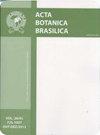野火不影响含铁cana生态系统中丛枝菌根真菌(Glomeromycota)的孢子丰度、物种丰富度和接种潜力
IF 1.1
4区 生物学
Q4 PLANT SCIENCES
引用次数: 0
摘要
坎加生态系统在浅层铁壳上发育,土壤浅且营养贫乏。在这些条件下,丛枝菌根真菌(AMF)在帮助植物克服非生物和生物胁迫方面发挥着重要作用。坎加可能遭受周期性燃烧,但尚不清楚火灾对AMF社区的影响。我们的目的是比较受烧伤(BC)影响的cana地区的AMF和没有既往烧伤史(NC)的AMF。我们比较了AMF的物种组成、孢子数量、物种丰富度和菌根接种潜力。真菌孢子总数、真菌种类丰富度和菌根定植量在不同地区间无显著差异。共恢复到10属23种,主要属禾本科和禾本科。BC和NC共有52%的AMF物种。在诱捕器培养中,长孢子虫、巨孢子虫和异花牙孢子虫只产生孢子。从孢子丰度、物种丰富度和侵染力等指标来看,甘加土壤AMF孢子群落不受焚烧的影响。我们的数据有助于盘点与Canga相关的土壤生物多样性,这是一个高度生物多样性和受威胁的巴西生态系统。本文章由计算机程序翻译,如有差异,请以英文原文为准。
Wildfire does not affect spore abundance, species richness, and inoculum potential of arbuscular mycorrhizal fungi (Glomeromycota) in ferruginous Canga ecosystems
Canga ecosystems develop over superficial iron crusts with shallow and nutrient-poor soils. Under these conditions, arbuscular mycorrhizal fungi (AMF) play an important role in helping plants to overcome abiotic and biotic stresses. Canga can suffer periodic burning and yet it is unknown what the impacts of fire are to AMF communities. We aimed to compare AMF in Canga areas affected by burning (BC) with those with no previous history of burning (NC). We compared AMF species composition, spore numbers, species richness, and mycorrhizal inoculum potential. The total number of spores, AMF species richness and mycorrhizal colonization measured in the infectivity bioassay were not significantly different between areas. A total of 23 species in 10 genera were recovered, with most species belonging to Gigasporaceae and Acaulosporaceae. BC and NC shared 52 % of AMF species. Gigaspora albida, Gigaspora gigantea, and Dentiscutata heterogama sporulated exclusively in trap cultures. We concluded that AMF spore communities were not affected by burning in Canga soils as measured by spore abundance, species richness and infectivity. Our data contribute to the inventory of soil biodiversity associated with Canga, a high biodiverse and threatened Brazilian ecosystem.
求助全文
通过发布文献求助,成功后即可免费获取论文全文。
去求助
来源期刊

Acta Botanica Brasilica
PLANT SCIENCES-
CiteScore
2.30
自引率
9.10%
发文量
32
审稿时长
6-12 weeks
期刊介绍:
Experimental, theoretical and applied papers on all aspects of plant (including algae) and fungi biology are welcome. The submitted manuscript or its essential content must not have been published previously or be under consideration for publication elsewhere. Contributions should be substantial, written in high-quality English and show general interest. We expect that the submitted manuscript presents a great novelty in Botany, and this should attract a wide audience. Considering this, case studies are only considered if the narrative and implications are provided to be of general interest. Thus, manuscripts that report aspects of local interest are discouraged unless the implications of the findings are wide-reaching. Manuscripts with agronomic subjects are expected to contain a substantial amount of basic plant biology. Please see below some details for specific area.
 求助内容:
求助内容: 应助结果提醒方式:
应助结果提醒方式:


